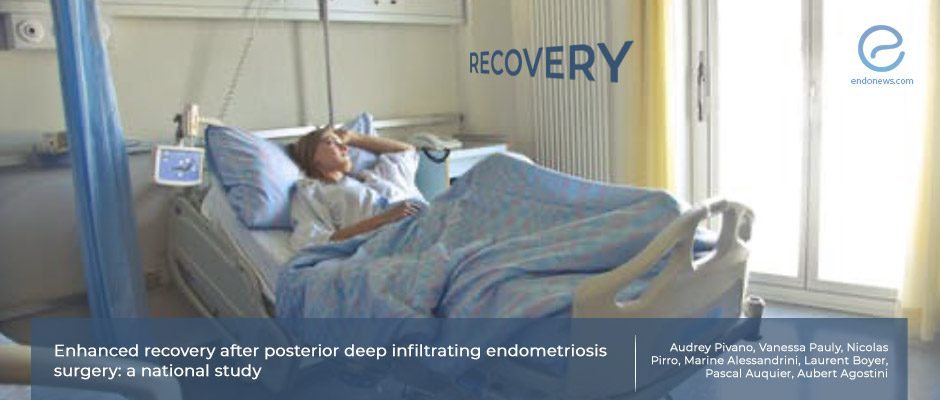A French National Study Concerning The "Recovery Protocol" After Deep Infiltrating Endometriosis Surgery.
Apr 20, 2022
"Enhanced recovery after surgery" protocol is beneficial for deep infiltrating endometriosis operations.
Key Points
Importance:
- Enhanced recovery after surgery in deep infiltrating endometriosis surgery would improve the management; however, a thorough evaluation of ERAS is still lacking.
Highlights:
- The implementation of the ERAS protocol significantly improved patient outcomes after deep infiltrating endometriosis surgery.
What's done here:
- This is a retrospective, observational, and comparative study started and continued in French hospitals based on the National French coding system that includes all hospital stays, diagnoses, procedures, and complications.
- The purpose of the study is to evaluate the impact of the implementation of another system named "Enhanced Recovery After Surgery (ERAS)" for posterior deep infiltrating endometriosis operations.
- The length of hospital stay, the rate of postoperative complications, and readmission within 30 days were compared for two groups, namely, before and after 2019 when ERAS was available.
Key Results:
- There was a total of 2990 hospital stays with a diagnosis of endometriosis, and 191 were appropriate to form the ERAS study population after matching.
- On the other hand, among 3998 patients with endometriosis diagnosis, 593 were found appropriate to form the "non-ERAS" population, with a ratio of 1:3.
- The mean length of hospital stay was shorter in the ERAS group compared to the non-ERAS group.
- The rate of postoperative abdominal or pelvic pain syndrome was lower in the ERAS group during the hospital stay.
- There was no statistical difference between the two groups regarding the rate of postoperative complications and the rate of readmission.
Lay Summary
In recent years especially for complex surgeries, enhanced recovery after surgery (ERAS) programs have been implemented in several surgical specialties. This is based on a multimodal and multidisciplinary approach centered on the patient’s perioperative situation designed to improve patient management and reduce the hospital stay. In France, ERAS program guidelines for surgical procedures were published in 2016 by the French National Health Agency.
Deep infiltrating endometriosis (DIE) is a serious form of the disease, surgery for DIE can be complex and surgery may be a source of potential postoperative major complications.
To evaluate the hospital stay, postoperative complication rate, and the readmission (within 30 days) of DIE surgeries, Pivano et al from the Department of Obstetrics and Gynecology, Aix-Marseille University, France, set up a retrospective observational comparative research. A total of 593 non-ERAS patients were matched and were compared to 191 ERAS patients operated on for deep infiltrating endometriosis.
The mean length of hospital stay was found to be shorter in the ERAS group compared to the non-ERAS group, and the postoperative abdominal or pelvic pain syndrome occurred less often in the ERAS group which is consistent with the literature.
However, regardless of the modality of hospital stay, the authors found a relatively low complication rate without a statistical difference when comparing the conventional approach to an ERAS model.
The authors stated that the application of the ERAS protocol in DIE surgery helps in shortening the hospital stay and decreasing postoperative abdominal pain in women with endometriosis.
This interesting study is recently published in the journal "Fertility and Sterility".
Research Source: https://pubmed.ncbi.nlm.nih.gov/34949453/
deeply infiltrated endometriosis enhanced recovery after surgery fast-track surgery gynecologic surgery.

